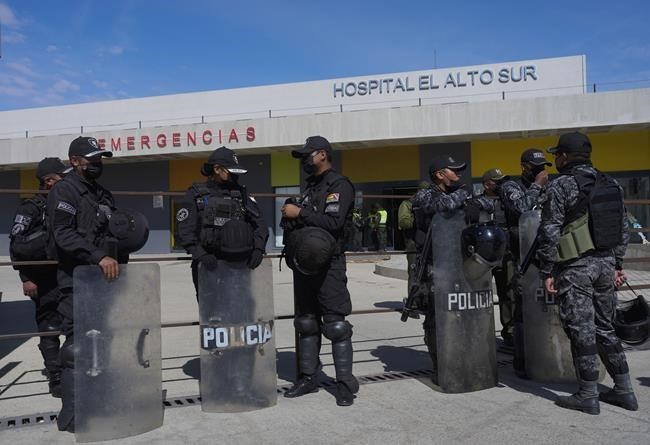
Police guard at the Del Sur Hospital after Luis Fernando Camacho, the opposition governor of Bolivia's most prosperous region, was taken there for tests, in El Alto, Bolivia, Wednesday, Sept. 6, 2023. Camacho was taken to the hospital after his health deteriorated during pre-trial detention in a prison where he has been serving since Dec. 2022 for alleged sedition and terrorism. (AP Photo/Juan Karita)
September 06, 2023 - 3:06 PM
LA PAZ, Bolivia (AP) — The governor of Bolivia’s most populous and richest region was allowed to briefly leave his high-security prison cell Wednesday for medical tests, highlighting how the politician widely considered the country’s opposition leader has been governing from behind bars for more than eight months.
Santa Cruz Gov. Luis Fernando Camacho, who has been in pretrial detention since Dec. 30 accused of sedition and terrorism, left Chonchocoro prison in Bolivia’s highlands for a few hours before returning. Last month, a 26-member medical board said Camacho should be allowed to undergo medical tests in a hospital instead of by prison doctors amid concerns about his health.
His lawyer, Martín Camacho, protested afterward that the governor had not been allowed to receive all the tests ordered by a medical board.
“The defense will request ... the cessation of preventive detention because his life is at risk,” the lawyer told the Associated Press.
International human rights experts say the imprisonment of Camacho, even though he has not been convicted of a crime, is an example of how Bolivia’s justice system is often used for political purposes.
Camacho, 44, has been in pretrial detention for allegedly orchestrating what prosecutors describe as a coup while leading mass protests in 2019 following elections the Organization of American States said were marred by fraud. Judges ruled the governor should be remanded in custody because he was a flight risk and could obstruct the ongoing investigation.
The governor, who remains in his post while in prison, has vehemently denied all charges and characterized his detention as a “kidnapping.”
No date has been set for his trial to start.
The eastern region of Santa Cruz, which makes up around one-third of Bolivia’s economic activity, has long been ruled by right-leaning governments opposed to the leftist central government in the capital of La Paz.
Images seen of Camacho during a July hearing showed that the governor had lost a significant amount of weight during his months behind bars, exacerbating worries about his health. His family has expressed concern over his Churg-Strauss syndrome, a disorder that inflames blood vessels and can lead to permanent damage of the organs if not properly treated, Natalia Ibáñez, Camacho's cousin, told the AP.
His lawyer, Martín Camacho, said that while he was in the hospital the governor suffered “a sort of arrhythmia but instead of stabilizing him, he was transferred back to Chonchocoro without receiving any tests." He characterized it as “an inhumane act” because “it is evident that his life is at risk.”
The lawyer earlier said the governor had lost anywhere between 12-15kgs (26-33lbs) and refused to be treated by prison doctors because they were not specialists.
Juan Carlos Limpias, the director of Bolivia’s prison system, insisted Camacho had received the necessary medical attention although he acknowledged in an interview last month that the governor had lost 7 kilograms.
“When he was detained, he weighed 62 kilograms, and now he weighs 54.9 kilograms,” Limpias told the AP in early August.
The international community has largely stayed silent on Camacho’s detention, which César Muñoz, the associate director of Human Rights Watch’s Americas division, said “has a clear political dimension,” noting that “there is no solid justification for him to be in preventive detention.”
Yet Camacho’s case is hardly uncommon in a country where more than 60% of detainees are in pretrial detention, and the independence of the judiciary is openly questioned.
“Pretrial detention should be the exception, not the rule,” Muñoz said, and in this case even more so considering Camacho is a well-known person who has a fixed residence and job, two arguments often used to justify being remanded in custody.
Tamara Taraciuk Broner, the director of the Rule of Law program at the Inter American Dialogue, said Camacho’s detention takes place “in a country where the lack of judicial independence is glaring.” Governments of all political stripes “have taken advantage of the absence of an independent judiciary to use the courts against political opponents.”
Camacho’s detention led to protests and road blockades in his native Santa Cruz that lasted weeks, but attention has waned as his preventive detention has been repeatedly extended.
The governor amounts to “a political trophy that has been seized to curb Santa Cruz,” said Erwin Bazán, a deputy from Creemos, the party Camacho leads.
Members of the ruling Movement Toward Socialism, however, insist Camacho’s detention is just.
“Camacho committed a coup in La Paz,” said Renan Cabezas, a MAS lawmaker.
The social upheaval that followed the 2019 presidential election left 37 people dead.
Gustavo Torrico, the federal government’s deputy minister for government management, even went as far as to mock the governor’s weight loss, saying in a July interview that it was due to a lack of exercise and the fact that Camacho was no longer eating hamburgers or drinking beer.
News from © The Associated Press, 2023